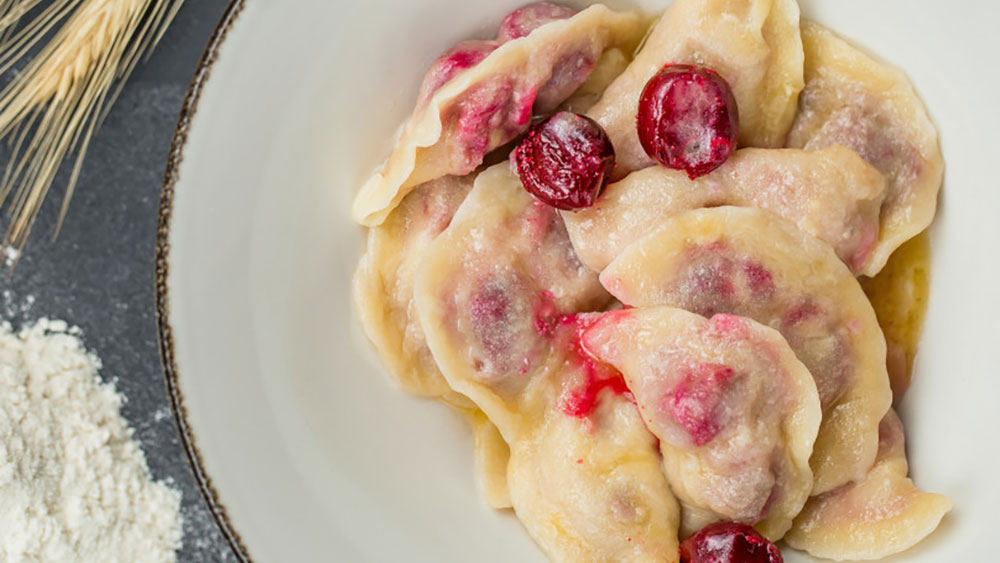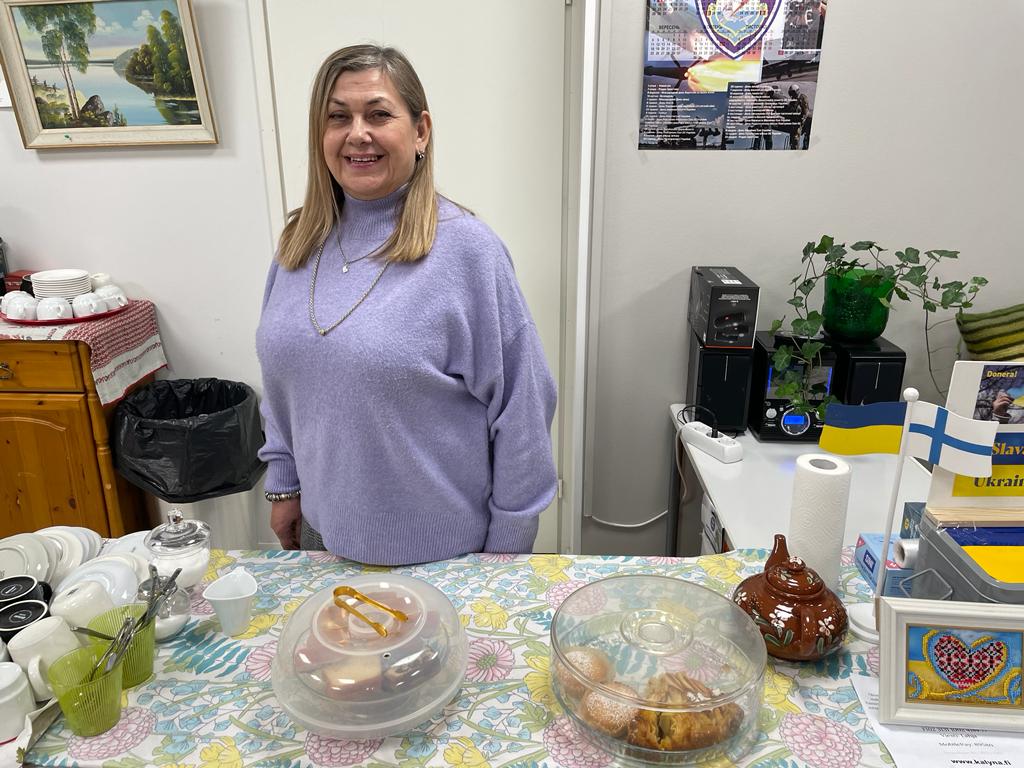Not only borscht: Ukrainian kitchen has a lot more to offer

Varenyky is one of the most popular dishes in Ukraine. These are varenyky with cherries but they can also be served with cottage cheese, potato, cabbage, or other fillings. PHOTO: PRESS SERVICE OF YEVHEN KLOPOTENKKO.
Svitlana Yeharmina
Published 30.01.2024 at 8:01
Updated 31.01.2024 at 10:25
Before the war, Halyna Berezovska had a café in Sumy, Ukraine. It was a ”sadyba”, a small tourist complex with a lavender field. After the war started she fled to Finland and settled in Vaasa.
Now, she wishes to open a café in Finland. It would be her way to thank Finns for their hospitality. It would also give her a sense of home and a chance to talk about Ukrainian culture.
Ukrainian dishes are mistaken for Russian
The Ukrainian cuisine remains relatively unknown in Finland. Dishes, such as ”borscht”, ”varenyky” or ”holybtsy”, are mistakenly taken to be Russian even though they are classic Ukrainian dishes.
In 2020, UNESCO included borscht in the national list of elements of the intangible cultural heritage of Ukraine.
In the last 30 years, only two Ukrainian restaurants have operated in Helsinki – one in the late ‘90s and another at the end of the last decade.
The latter, Odessa, closed down due to Covid crisis. The menu included Ukrainian dishes that were prepared according to modern trends.
Rich regional kitchen
“Ukraine has a developed agricultural culture. Each region has its own special recipes and dishes,” says Olena Braichenko, a researcher of Ukrainian gastronomic culture.
More than 100 recipes are known for borscht. All these recipes are considered authentic.
“Borscht is well known abroad as a dish cooked with meat, although in the southern part of the country it can be cooked with fish.”
In the western part of the country, on the other hand, porcini mushrooms, smoked meat or dried fruit can be added to borscht.
In Ukraine, borscht can be red, green or white.
Familiar ingredients for Finns
“The pearl of Ukrainian cuisine is, of course, borscht. But the Finns may also like “deruny” and “shuba,” says Eero Talvitie.
Talvitie has spent around 30 years in Kyiv and has opened more than 30 restaurants in Ukraine. He believes that Ukrainian cuisine has every chance of pleasing his compatriots.
“Deruny” are fritters made of grated potatoes. The use of root vegetables is popular in Ukrainian cuisine, not only potatoes, but also baked beets, carrots and parsnips.
“Shuba” is a popular Soviet dish, which includes lightly salted herring, boiled vegetables and eggs. The salad is laid out in layers, which are smeared with mayonnaise.
According to the researcher Olena Braichenko Finns might also like other Ukrainian specialties such as sour rye, dairy dishes, smoked meats and sweet Ukrainian pastries.
She also points out that dishes from Polissia region could be a success. A lot of berries and mushrooms are used in cooking same as in Finland. One typical dish, for example, is a milk soup with chanterelles and millet.
Pastries for those with a sweet tooth

Halyna Berezovska has not yet decided whether to open a café in Vaasa, where she found protection after the war, or in Helsinki, where her daughter lives.
Currently, she is studying the market to understand which national dishes would appeal most to Finns.
According to Berezovska the menu will definitely include Ukrainian sweet pastries as “nalysnyky” (pancakes with a sweet filling) and “vergyny” (crispy pastry fried on the pan).
Recipes
PARSNIP SALAD
For two servings
Ingredients:
60 g parsnips
40 g green apples
40 g fresh cherries
50 g spinach leaves
50 g sweet pepper
20 g shelled walnuts
10 g fresh mint leaves
20 g sunflower oil
Dressing:
40 g hemp oil
10 g honey
5 g apple cider vinegar
salt, pepper
Cooking:
1. Wash all the vegetables and dry them with a towel. Cut the parsnip and sweet pepper into small triangles and fry in sunflower oil or grill.
2. For the dressing, add apple cider vinegar, salt and pepper and gradually pour hemp oil into the honey until a mass of uniform consistency is obtained.
3. Cut the apple into thin strips, add chopped walnuts and a little dressing. Remove the pits from the cherries and mix them with chopped mint.
4. Wash and dry the spinach leaves. Put the fried vegetables mixed with part of the spinach on a plate, then add the apple with nuts and the other parts of the spinach. Dress the salad and sprinkle with cherries and mint.
* Spinach leaves can be replaced with leaf lettuce, fresh, dried cherries or soft, sweet or sour berries.
Sourсe: yizhakultura.com, Olena Braichenko
RED BORSCHT
For 8-10 servings
Ingredients
400–500 g of pork ribs
2 beetroots
2 tomatoes
¼ celery root
¼ head of cabbage
3–4 potatoes
1–2 carrots
1 onion
1–2 smoked pears
2 bay leaves
3 peas of allspice
1 head of garlic
1 sweet pepper
200 ml of tomato juice
30 g of butter
2 tablespoons of tomato paste
3 liters of water
salt to taste
Boiled or canned beans are optional
Prepare the meat:
Wash the pork ribs, remove the membrane and put the ribs in a baking dish. Bake in the oven for 30 minutes at a temperature of 200 degrees.
Prepare vegetables for broth:
Wash the celery root and carrots and cut them into arbitrary pieces. Cut off half of the onion.
* Vegetables do not need to be peeled. You can pre-bake the vegetables in the oven, and then the taste of the dish will be more intense.
Prepare frying:
Cut the sweet pepper into small cubes. For a more intense color, it is better to use red pepper.
Finely chop the tomatoes and onion (the second half). Heat a pan with 30 g of butter and then add chopped peppers, tomatoes and onions. Fry the vegetables until they become soft. Add 200 ml of tomato juice and 2 tablespoons of tomato paste and stew for another 5–7 minutes.
Grate one beetroot on a coarse grater and add to the saucepan.
Simmer for another 3–4 minutes.
Borscht:
Transfer the baked ribs to a saucepan with a thick bottom and pour 3 liters of water. Add chopped vegetables for broth. Bring to a boil and cook over medium heat for another 30 minutes. Remove the cooked vegetables from the broth.
Cut the potatoes into medium cubes and put them in a saucepan. Squeeze the juice from the second beetroot or rub it on a fine grater and put it into the saucepan. Next, add 3 peas of allspice, 2 bay leaves and salt to taste.
Finally, add half a head of garlic. For a more intense taste, squeeze another 2–3 cloves of garlic.
Cook until the potatoes are almost fully cooked. Then 5 minutes before cooking, add chopped cabbage and smoked pears to the borscht. Salt to taste.
If desired, you can add boiled or canned beans to the borscht.
Recipe by Halyna Berezovska